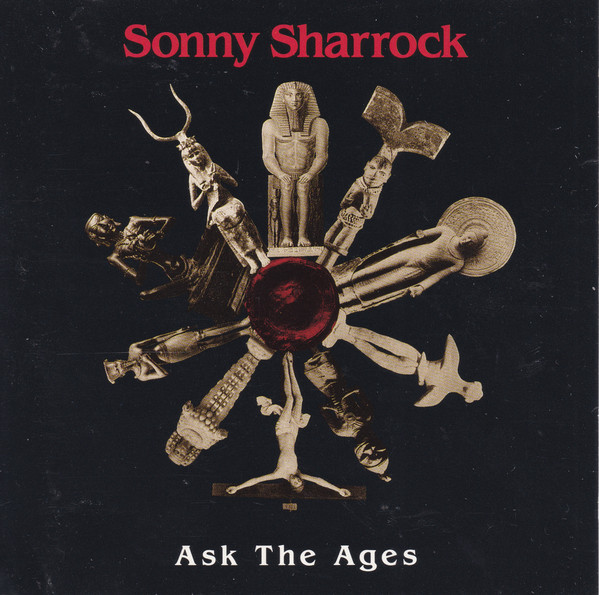Music Notes

Perhaps my all-time favorite album is Sonny Sharrock’s 1991 masterpiece Ask the Ages. By far the best album of his career, it’s literally the perfect jazz album, combining straight ahead melody with noisy experimentation and some of the best players in jazz history (Pharoah Sanders, Elvin Jones, and Charnett Moffett). When I first heard this a couple of years after its release, it was almost unknown except to music nerds. It’s become something of a recognized classic now and Pitchfork had a long review of the album last weekend that sums up its greatness quite well.
The connection between masculinity and guitar in popular music has a long and unfortunate history. The entire guitar hero culture is extremely masculine and it has transcended genre, being something that is more than rock and roll, though very much connected to it. But now, finally, there are non-white guys breaking through in the solo guitar world and making a big name for themselves. Here’s a story on a few of them.
Duke Ellington quotes on his composing process.
The lost recordings of Hassan Ibn Ali
Meet your National Endowment for the Arts Jazz Masters for 2021, including Henry Threadgill.
NPR’s Alt Latino podcast has an episode on the regional musical styles of Mexico.
The hopping musical scene these days in Accra.
Album Reviews:
Willie Nelson, First Rose of Spring
Willie’s late career albums have certainly been a mixed bag, but then so has his entire career outside of the mid to late 70s. He’s a very old man. But by god if this is not a pretty damn good album. It’s not a career best or anything. But how he sounds this good in his late 80s is a true marvel. At times, his voice is a bit quavering, but that just adds to the atmosphere. There’s not many originals here, but who cares. That doesn’t really matter anyway. This is simply put a very, very solid country music album.
A-
Sarah Pagé, Dose Curves
There’s been a number of harpists who have made a splash on the music scene over the last 15 years, which is kind of surprising. Pagé, a Canadian harpist, is among the latest. This is her 2019 solo harp album that is really quite lovely, an album that plays with the structures of the instrument using a lot of pedals and effects and that also shows a quite excellent grasp of composition. This might not be for everyone, but I thought it strong.
A-
Steve Earle, Ghosts of West Virginia
This is not Earle’s finest album, but it certainly is a strong enough one. Written as the soundtrack to a play about the 29 deaths in the Upper Big Branch Mine in 2010, this is a combination of some fairly standard but still useful versions of the long Americana tradition of coal mine ballads and an angry Earle saying the names of all the dead in one song. The kind of late-career work one hopes for from one of the all-time greats, as inconsistent as he can sometimes be.
B+
Of Montreal, UR Fun
Never been much of a fan; this album did not convert me. Too twee, too derivative. Competent enough pop music, but without believing in itself as lyrical content itself to really shine.
B-
Beabadoobee, Fake It Flowers
I probably like this album more than I should. Bea Kristi is a London-based songwriter who goes by Beabadoobee. She sings in the teen heartbreak/anger themes that are best personified recently by artists such as Soccer Mommy. With strong 90s alt-rock influences worn on its sleeve, she isn’t the strongest songwriter quite yet. Lyrics such as “Kiss my ass/you don’t know jack” are not exactly high-end poetry. But they are also the honest anger of a young woman at the boys in her life and I appreciate that anger, even if the expression of it is a bit unsubtle. She’s also a good guitar player, which never hurts.
B
Samuel Rohrer, Continual Decentering
European minimalism on the jazz/classical border, which is quite fertile ground these days. This is a solo album, deeply layered with various forms of percussion, keyboard, and electronics that I don’t think would really be possible to replicate live. The extent to which this interests you probably depends on how that description sounds. If ambient/experimental/percussive music is your thing, you might like this a lot. I thought it was worthy, but probably not worthy enough that I am going to buy it.
B
Keleketla!, Keleketla!
One of the many neat truly global music projects of the last few years. That term is usually worthless, covering any type of music from all sorts of musical traditions, or even worse, half-baked projects taking two or three different musicians and producing something that is a shell of quality compared to their usual output. But this is different. Combining musicians from Los Angeles, West Papua, South Africa, London, and Nigeria, this is very much a record of the African diaspora. Which, I mean, whatever, except that it’s pretty fantastic. The core here is a collaboration between Coldcut, which is a London-based electronic duo and the Keleketla! library in Johannesburg. Working together, they collected primary African and diaspora musicians for a fascinating collaboration. Among them were Tony Allen, Shabaka Hutchings, Benny Wenda, and Nono Nkoane. There’s so much love here that the collaboration works very well.
A-
As always, this is an open thread for all things music and art and none things politics.


